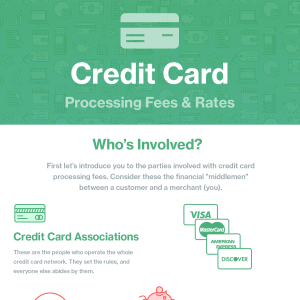We break down the differences between payment service providers and merchant accounts, including costs, contracts, pros and cons, and more.
Our content reflects the editorial opinions of our experts. While our site makes money through
referral partnerships, we only partner with companies that meet our standards for quality, as outlined in our independent
rating and scoring system.
What is a payment service provider? If you’ve been reading about credit card processing, there’s a decent chance you’ve come across the term payment service provider (or PSP). While “payment service provider” is sometimes used interchangeably with terms like “merchant account” or “payment processor,” it actually refers to a specific type of payment service.
Read on as we explain a payment service provider (PSP), provide some examples of the best credit card payment processing providers, and discuss the pros and cons of using a PSP.
What Is The Definition Of A Payment Service Provider?
A payment service provider (also known as a PSP) provides merchants with the ability to accept electronic payments, such as credit cards, debit cards, and digital wallets (e.g., Samsung and Apple Pay), during both online and in-person transactions.
While payment service provider is the technical name for them, these companies are better known by many merchants as “third-party processors” or even “aggregators.” And herein lies the critical distinction with a payment service provider: Unlike a traditional merchant account, where merchants have a unique, separate account, a PSP combines all merchant accounts as sub-users under its umbrella merchant account.
The Pros & Cons Of Using A Payment Service Provider
Pros
- Convenience: PSPs are one of the most accessible forms of payment processing
- No Maintenance Fees: You generally only pay for a PSP when you’re using it. If you take a month or two off, it costs you nothing.
- Fast Setup: You can sign up for a PSP within a matter of minutes.
- Free Software: If you’re just getting your business off the ground, it can be very convenient to bundle your inventory tracking, invoicing, and other services with your PSP.
Cons
- Account Holds & Freezes: PSPs are more often subject to account instability than merchant accounts
- Scaling Issues: PSPs tend to cater to small, lower-volume businesses. An established business can easily outgrow the default PSP plan, so make sure to speak with your provider about getting a plan more suited to your volume when you approach the $10K/month threshold.
- Restricted Industry Lists: While not unique to PSPs, they tend to be less inclined to take on high-risk industries.
PSPs VS Merchant Accounts
The following table breaks down some of the general characteristics of payment service providers vs. merchant accounts (although some outliers do exist in both categories).
|
PSP |
Merchant Account |
| Credit Card Processing |
|
|
| Business Has Unique Merchant Account |
|
|
| Quick & Easy Approval |
|
|
| Generally Comes With Integrated Productivity Software |
|
|
| Stable Accounts |
|
|
| Suitable For High-Risk Businesses |
|
|
| No Monthly Administrative Fees |
|
|
The biggest difference is that a payment service provider facilitates one large merchant account, with individual business users being sub-users. A merchant account provider is more traditional in the sense that every merchant has an individual account.
Vetting Processes
A payment service provider takes on the full financial risk of each business under its account. For the most part, this scenario is beneficial to the merchant because it makes accepting credit cards more accessible — the signup and approval process is practically instantaneous!
Much of the customer vetting is done after the signup, however, which can take some businesses by surprise. PSPs such as Stripe allow payment processing to begin immediately but hold the business’s funds for about two weeks to complete the vetting process.
The vetting process for each merchant is much more thorough in the merchant account model because the provider is dealing with the merchant directly. This typically includes credit checks and a more thorough look at the business’s cash flow and history.
However, once that process is complete, the account is associated specifically with that business, which can make it easier to resolve issues should they arise.
Inclusive Pricing
Merchant services aren’t exactly known for simple, transparent pricing, but payment service providers buck the trend by drastically simplifying the costs. Most of a PSP’s costs are covered by flat transaction fees. In most cases, your payment gateway and checkout are all covered for eCommerce selling, too.
The other nice thing is that you typically don’t have to pay additional fees for payment security because PCI compliance is bundled into your account.
Merchant accounts, on the other hand, often have a laundry list of itemized fees.
This doesn’t necessarily mean PSPs are cheaper than merchant accounts, though (more on this below).
Additional Merchant Tools Sweeten The Deal
Generally, a merchant account is laser-focused on payment processing, while a third-party processor takes a much different approach to serving merchants. A PSP aims to be more of an all-in-one solution for merchant services. For instance, with most third-party processors, you get hardware freebies, such as a mobile reader, to get you started.
With a payment service provider, you are typically buying into an entire platform of other types of business tools that complement payment processing. For instance, Square, Stripe, and Shopify offer reporting features, invoicing tools, and many add-on software options that are included for a reasonably low cost. They also provide their own gateways for users who want to sell online. So a merchant using Square could set up a loyalty program, utilize the free analytics reporting, and even send an email marketing campaign — all from a single account!
Customer Support & Stability Issues
Customer service and account stability can be an issue for payment service providers. This stems back to the approach they take to vetting accounts and the responsibility they take by aggregating merchants into a single account.
Because third-party processors don’t thoroughly vet your business before approving your account, they analyze individual transactions with much greater scrutiny after your account is established. That means that a single abnormally large transaction could trigger an account hold while the company’s analysts evaluate whether it’s genuine. In some cases, the PSP might even terminate your account suddenly for what its algorithm deems as risky behavior.
What’s worse is that if you do have an account problem with a PSP, it can be difficult to reach a live customer support representative to resolve it.
Check out our post on avoiding merchant account holds and terminations to find out how you can prevent this unpleasantness.
Is A PSP Cheaper Than A Merchant Account?
Generally speaking, PSPs are a good value for small, seasonal, or new businesses with relatively low transaction volumes, as they minimize overhead costs. Meanwhile, merchant accounts are often cheaper for well-established, higher-volume businesses that can take advantage of economy-of-scale pricing.
Let’s break it down some more.
Pricing Structures
Payment service providers often use a flat-rate pricing structure, meaning you pay the same amount for a transaction regardless of card type (something like 2.75% or 2.9% + $0.30 per transaction). Usually, PSPs have a low or no monthly fee and no other costs beyond transaction fees.
Transaction costs are typically deducted from every transaction, a model known as “pay as you go.” Very small businesses, in particular, tend to save money with this pricing model. But even higher-volume businesses can occasionally save more with flat-rate pricing.
All of the costs associated with a traditional merchant account tend to be a little harder to pin down, which is why it’s so important to read your contract and understand what you are committing to and what fees to expect — because, more often than not, there is more than meets the eye. Merchant account providers usually use one of the following pricing structures:
- Tiered Pricing: Transactions are grouped into qualified/non-qualified categories, with qualified transactions costing the least. This model is supposed to simplify payment processing but often leads to merchants paying more over time as a significant portion of transactions are treated as non-qualified. Pricing might be listed as 1.85% + $0.15 for a qualified transaction and 2.65% + $0.20 for a non-qualified transaction.
- Interchange-Plus/Cost-Plus Pricing: The payment processor passes on the interchange fees mandated by the card networks, as well as a small markup. Pricing might be listed as cost/interchange + 0.2% + $0.10 per transaction.
- Subscription Pricing: Merchants pay a monthly “membership” fee instead of a percentage-based markup, usually along with a small flat fee per transaction. Pricing for this model might be listed as $49/month + 0% markup + $0.15 per transaction.
Which Pricing Model Is Best?
Pricing structures can make a massive impact on your bill at the end of the day, so be sure to understand what services are billed separately. Typically, smaller businesses do better with a PSP, and once revenue climbs, a traditional merchant account can give you a better deal.
However, even now, nearly every third-party processor we review here also offers high-volume pricing. Most businesses processing somewhere between $10k and $15k/month in credit cards can start to see cost savings with a merchant account or qualify for a volume discount plan from a PSP.
Want to know more about credit card processing costs? Check out our guide to credit card processing rates and fees.
Account Closure Fees With Merchant Accounts & PSPs
When it comes to a contract, there is a big difference between a PSP and a merchant account. PSPs usually operate on a pay-as-you-go or monthly basis, and there’s no penalty for canceling the service. Merchant accounts, on the other hand, are a different story.
The industry standard for merchant accounts is still a three-year contract with an automatic renewal clause that renews for a one or two-year period after the initial term. Closing your account early can lead to a costly early termination fee (ETF). That said, the industry is changing and trying to keep up with the times. Plenty of reputable merchant account providers offer month-to-month agreements that you can terminate without racking up expensive fees.
Which Payment Processors Are Payment Service Providers?
While most payment processors are merchant account providers, some of the biggest names in the industry are payment service providers. These include some big names, such as Square, PayPal, and Shopify Payments, as well as Stripe and Toast.
If you’re wondering what separates some of these providers from each other and which would be best for your business, we have pieces that compare Stripe vs. Square, Square vs. PayPal, and Stripe vs. PayPal.
These companies are some of the most well-known, but there are many other PSP companies out there.
Is A Payment Service Provider Right For You?
We’ve shared a fair amount of food for thought in this post, and ultimately, it’s up to each merchant owner to decide if a payment service provider is right. Of course, keep in mind that this post is speaking in generalities, and each PSP will have its own set of pros and cons.
To help support you on your journey, we have additional resources, including our full guide to third-party payment processors, which goes into more detail.
In the meantime, we hope this post gives you the information you need to go down the right path to entrepreneurial success!












